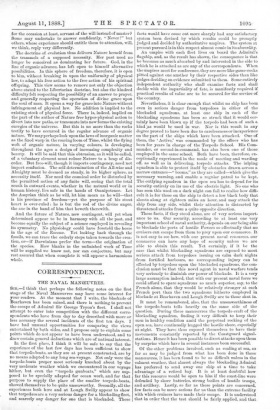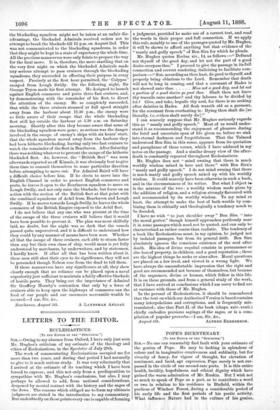CORRESPONDENCE.
THE NAVAL MANCEUVRES.
Sra,—I think that perhaps the following notes on the first stage of the Naval Manceuvres may have some interest for your readers. At the moment that I write, the blockade of Bearhaven has been raised, and there is nothing to prevent the escape of Admiral Sir George Tryon's fleet. I shall not attempt to enter into competition with the different corre- spondents who have from day to day described with more or less accuracy the several incidents of the first ten days. I have had unusual opportunities for comparing the views entertained by both sides, and I propose only to explain some points which do not appear to have been understood, and to draw certain general deductions which are of national interest.
In the first place, I think it will be safe to say that the experience of the last few days has been sufficient to show that torpedo-boats, as they are at present constructed, are by no means adapted to any long sea-voyage. Not only were the torpedo-boats proper most seriously knocked about by the very moderate weather which we encountered in our voyage hither, but even the "torpedo gunboats," which are sup- posed to be specially adapted for ocean work, and for that purpose to supply the place of the smaller torpedo-boats, showed themselves to be quite unseaworthy. Secondly, all the experiences both here and at Lough Swilly appear to show that torpedoes are a very serious danger for a blockading fleet, and scarcely any danger for one that is blockaded. These facts would have come out more sharply had any satisfactory system been devised by which results could be promptly judged and decided by authoritative umpires. The system at present pursued is in this respect almost comic in its absurdity.
An umpire with each fleet lives on board the Admiral's flagship, and, as the result has shown, the consequence is that he becomes as much absorbed by and interested in the side to which he is attached as are any of the correspondents. When the umpires meet for conference, they are more like game-cocks pitted against one another by their respective sides than like judges deciding on evidence submitted to them. Some entirely independent authority who shall examine facts and shall decide with the impartiality of fate, is manifestly required if practical results of value are to be secured for the service of the country.
Nevertheless, it is clear enough that whilst no ship has been even in serious danger from torpedoes in either of the blockaded squadrons, at least one ship in each of the blockading squadrons has been so struck that it would cer- tainly have been blown up if the torpedo had been of such a kind .`as would be used in war. Nor is this result in any degree proved to have been due to carelessness or inexperience on the part of the ships which have been attacked. One of them, the ' Active,' was commanded by the officer who has been for years in charge of the Torpedo School. His Com- mander, or second-in-command, has also been one of those employed in the same school. Both have been, therefore, ex- ceptionally experienced in the mode of meeting and warding off, as well as in delivering, torpedo attacks. The inlying squadron is able to protect itself by obstacles drawn across a narrow entrance—" booms," as they are called—which give the necessary warning, and enable a regular patrol to be kept. The outlying squadron in the open sea has to depend for its security entirely on its use of the electric light. No one who has seen this used on a dark night can fail to realise how diffi- cult it is for those on the ship to detect a low black body that shoots along at eighteen miles an hour, and may attack the ship from any side, whilst their attention is distracted by threatened attacks from a quite opposite direction.
These facts, if they stood alone, are of very serious import- ance to us. Our security, according to at least one very important school of naval authority, depends on our being able to blockade the ports of hostile Powers so effectually that no cruisers can escape from them to prey upon our commerce. It is not easy to see how, with our present naval resources, our commerce can have any hope of security unless we are able to obtain this result. Yet certainly, if it be the case that whilst blockading squadrons are exposed to most serious attack from torpedoes issuing on calm dark nights from fortified harbours, no corresponding injury can be effected by torpedoes upon the blockaded squadrons, the con- clusion must be that this novel agent in naval warfare tends very seriously to diminish our power of blockade. It is a very large assumption indeed, that with our present naval force we could afford to spare squadrons so much superior, say, to the French alone, that they would be relatively stronger at each French port than the two squadrons hitherto employed in blockade at Bearhaven and Lough Swilly are to those shut in.
It must be remembered, also, that the unseaworthiness of the torpedo-boats tells heavily on the same side of the question. During these manoeuvres the torpedo craft of the blockading squadron, finding it very difficult to keep their men in healthy condition amid the perpetual rocking of the open sea, have continually hugged the hostile shore, especially at night. They have thus exposed themselves to have their movements constantly reported by the Coastguard signal- stations. Hence it has been possible to direct attacks upon them by surprise which have in several instances been successful.
Of the other problems involved, such as coaling at sea, so far as may be judged from what has been done in these manoeuvres, it has been found to be so difficult unless in the calmest weather, that almost always the blockading Admiral has preferred to send away one ship at a time to take advantage of a retired bay. It is at least doubtful how far this resource would be open to him if the coast-line were defended by shore batteries, strong bodies of hostile troops, and artillery. Lastly, so far as these points are concerned, few facts can be more serious for us than the extreme facility with which cruisers have made their escape. It is understood that in order that the test should be fairly applied, and that the blockading squadron might not be taken at an unfair dis- advantage, the blockaded Admirals received orders not to attempt to break the blockade till 12 p.m. on Auguit 2nd. This was not communicated to the blockading squadrons, in order that they might be kept in a state of expectancy the whole time. All the previous manoeuvres were only feints to prepare the way for the final move. It is, therefore, the more startling that on the very first night on which the blockaded Admirals made any serious attempt to pass cruisers through the blockading squadrons, they succeeded in effecting their purpose in every respect. Precisely at the first hour permitted, the Calypso' escaped from Lough Swilly. On the following night, Sir George Tryon made his first attempt. He designed to launch against English commerce and ports three fast cruisers, and, by demonstrating with the remainder of his fleet, to divert the attention of the enemy. He so completely succeeded, that while the three cruisers steamed at full speed straight away from the harbour about 11.30 p.m., the enemy were so little aware of their escape that the whole blockading fleet still lay outside the harbour at 530 a.m. on Saturday morning. Shortly after this they became aware that some of the blockading squadron were gone; so serious was the danger involved in the escape of enemy's ships with six hours' start, that the whole squadron moved away from the harbour they had been hitherto blockading, leaving only two fast cruisers to watch the remainder of the fleet in Bearhaven. After Saturday there was nothing whatever to prevent the escape of the hitherto blockaded fleet. As, however, the "British fleet" was soon afterwards reported as off Kinsale, it was obviously best to give them time to commit themselves to some particular direction before attempting to move out. For Admiral Baird will have a difficult choice before him. If he elects to move into the English Channel in order to protect English commerce and ports, he leaves it open to the Bearhaven squadron to move on Lough Swilly, and not only raise the blockade, but force on an action with the section of the British fleet at that point with the combined squadrons of Achil from Bearhaven and Lough Swilly. If he moves towards Lough Swilly, he leaves the whole commerce of the British Empire exposed to the Achil fleet.
I do not believe that any one who was present at the time of the escape of the three cruisers will believe that it would have been possible to prevent it. The plan was most skilfully laid, no doubt, but the night was so dark that the vessels passed quite unperceived, and it is difficult to understand how they could by any manner of means have been seen. Whether all that the escape of three cruisers, each able to steam faster than any but their own class of ship, would mean is yet fully understood by merchants, by underwriters, and by statesmen, I hardly know. If after all that has been written about it, these men still shut their eyes to its significance, they will not be persuaded though Nelson rose from the dead to tell them. If these manoeuvres have any significance at all, they show clearly enough that no reliance can be placed upon a naval superiority just sufficient to maintain a fairly effective blockade of hostile ports. They bring out the importance of Admiral Sir Geoffrey Hornby's contention that only by a force of cruisers able to keep open the highways of commerce can the food of our people and our enormous mercantile wealth be secured.—I am, Sir, &c.,



































 Previous page
Previous page